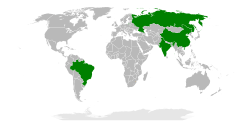BRIC | |
|---|---|
 | |
| Type | Foreign investment strategies grouping |
| Membership | |
| Establishment | |
• Term coined by Jim O'Neill | 2001 |
• Goldman Sachs closes BRIC fund | 2015 |
| Area | |
• Total | 38,464,219 km2 (14,851,118 sq mi) |
| Population | |
• 2022 estimate | 3,157,441,470 |
| GDP (PPP) | 2022 estimate |
• Total | $49.967 trillion |
| GDP (nominal) | 2022 estimate |
• Total | $27.107 trillion |
BRIC is a term describing the foreign investment strategies grouping acronym that stands for Brazil, Russia, India, and China. The separate BRICS organisation would go on to become a political and economic organization largely based on such grouping.[1] The grouping has been rendered as "the BRICs", "the BRIC countries", "the BRIC economies", or alternatively as the "Big Four".[2][3][4][5]
The term was first coined by economist Jim O'Neill and later championed by his employer Goldman Sachs in 2001. O'Neill identified the four countries as emerging markets and rising economic powers which were at a similar stage of newly advanced economic development. Goldman Sachs, of which O'Neill was the head of global economics research, would continue reporting and investing in their BRIC fund until 2015.[6] In a 2023 retrospective article, O'Neill commented that after the term's initial proposal, it gained an outsized popularilty in the 2000s and 2010s to explain the economic conditions of the four countries. He also conceded that the reports published by Goldman Sachs, which presented an optimistic possibility of the BRIC economies in the year 2050, were most likely not going to come true as economic downturns in the 2010s and early 2020s severely altered the trajectory of each country's economies.[7][8]
The acronym was co-opted by the countries themselves beginning in the late-2000s. The 1st BRIC summit in 2009, which founded the BRICS organisation, was held between the leaders of the four countries, with later summits involving South Africa beginning in 2010.[9][10] O'Neill commented on the 2010 summit by drawing a distinction between his BRIC term and the BRICS organisation, arguing that South Africa was too small as an economy to join the BRIC ranks.[11] In further comments in 2023, O'Neill stressed that he "never encouraged them to develop a political club" and that the organisation appeared to exist just as "a club that the US is not a part of."[12]
- ^ "New era as South Africa joins BRICS". SouthAfrica.info. Archived from the original on 18 April 2011. Retrieved 19 June 2012.
- ^ O'Neill, Jim (30 November 2001). Building Better Global Economic BRICs, Global Economics Paper No: 66 (PDF). Goldman Sachs.
- ^ O'Neill, Jim; Dominic Wilson; Roopa Purushothaman; Anna Stupnytska (1 December 2005). How Solid are the BRICs? Global Economics Paper No: 134 (PDF). Goldman Sachs. Retrieved 27 March 2024.
- ^ Dominic Wilson, Roopa Purushothaman (1 October 2003). Dreaming with BRICs. Global Economics Paper No. 99. Goldman Sachs.
- ^ "Another BRIC in the wall". The Economist. 21 April 2008. Archived from the original on 9 February 2015. Retrieved 28 July 2014.
- ^ Rana Foroohar (10 November 2015). "Why the Mighty BRIC Nations Have Finally Broken". Archived from the original on 20 December 2016. Retrieved 6 December 2016.
- ^ "The future of the BRICS and the New Development Bank | Global Policy Journal". www.globalpolicyjournal.com. Retrieved 23 October 2024.
- ^ Jim O'Neill, Lord O'Neill of Gatley (2024). "The future of the BRICS and the New Development Bank". Policy Insights. 15 (2): 383–388. doi:10.1111/1758-5899.13195.
- ^ Halpin, Tony, "Brazil, Russia, India and China form bloc to challenge US dominance" Archived 2 September 2011 at the Wayback Machine, The Times, 17 June 2009.
- ^ Graceffo, Antonio (21 January 2011). "BRIC Becomes BRICS: Changes on the Geopolitical hessboard". Foreign Policy Journal. Archived from the original on 26 January 2011. Retrieved 14 April 2011.
- ^ Reuters 2011 Investment Outlook Summit, London and New York, 6–7 December 2010
- ^ "Lord Jim O'Neill: 'I never intended for BRICs to become a political club'". ETF Stream. 14 November 2023. Retrieved 23 October 2024.